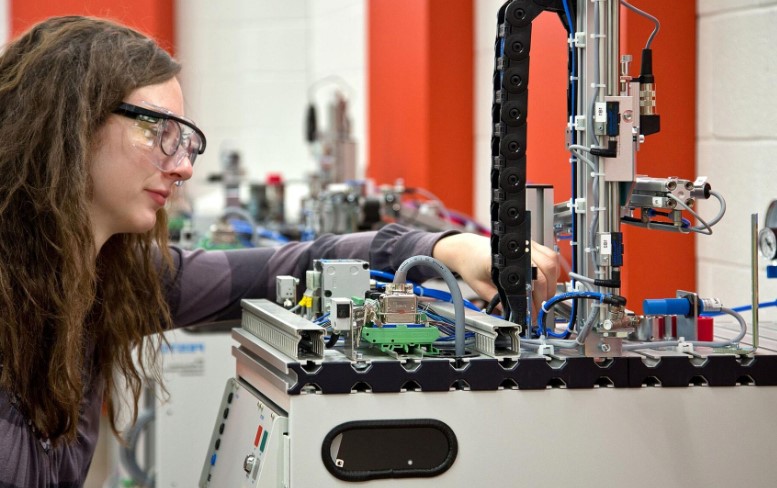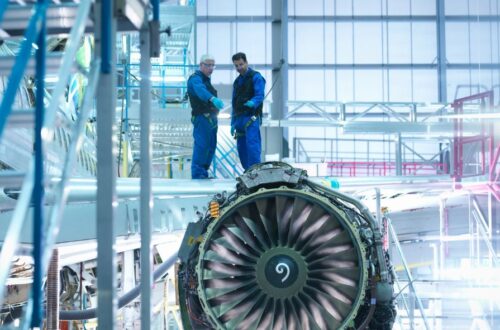
Mechanical Engineering
Mechanical engineering is a fascinating discipline that encompasses the design, analysis, and manufacturing of mechanical systems. It plays a vital role in the development of various industries and is responsible for creating innovative solutions to complex problems. In this article, we will explore the world of mechanical engineering, its historical background, core concepts, sub-disciplines, applications, current trends, and future prospects.
Introduction to Mechanical Engineering
Mechanical engineering is one of the oldest and broadest branches of engineering. It involves the application of principles from physics and materials science to design and manufacture mechanical systems. Mechanical engineers are involved in various stages of product development, from conceptualization and design to testing and production.
Historical Background of Mechanical Engineering
The roots of mechanical engineering can be traced back to ancient civilizations where advancements in mechanics and machinery were made. The Industrial Revolution in the 18th century marked a significant milestone for mechanical engineering, as it led to the development of machines, steam engines, and the mechanization of various industries.
Importance and Scope of Mechanical Engineering
Mechanical engineering plays a crucial role in shaping modern society. It is involved in almost every aspect of our lives, from transportation and energy systems to manufacturing and healthcare. Mechanical engineers are responsible for designing and improving the machines and systems that make our lives easier and more efficient.
Core Concepts and Principles in Mechanical Engineering
Statics and Dynamics
Statics and dynamics are fundamental concepts in mechanical engineering. Statics deals with the equilibrium of objects at rest, while dynamics focuses on the motion of objects and the forces that cause that motion. Understanding these principles is essential for designing stable and functional mechanical systems.
Thermodynamics
Thermodynamics is the study of energy and its transformations. It plays a crucial role in the design of engines, power plants, and heating and cooling systems. Mechanical engineers use thermodynamics to optimize energy conversion processes and improve the efficiency of systems.
Fluid Mechanics
Fluid mechanics deals with the behavior of fluids (liquids and gases) and their interactions with solid objects. It is essential for designing pumps, turbines, and other fluid-based systems. Understanding fluid mechanics helps mechanical engineers analyze and optimize the flow of fluids in various applications.
Material Science and Engineering
Material science and engineering focus on the properties and behavior of different materials. Mechanical engineers need to understand the characteristics of materials to select the most appropriate ones for a given application. They also study the behavior of materials under different conditions such as stress, temperature, and strain to ensure the safety and reliability of mechanical systems.
Sub-disciplines of Mechanical Engineering
Mechanical engineering is a diverse field with various sub-disciplines that cater to different industries and applications. Some prominent sub-disciplines include:
Automotive Engineering
Automotive engineering involves the design, development, and production of vehicles. Mechanical engineers in this field work on improving the performance, safety, and efficiency of automobiles. They are responsible for designing engines, chassis, suspension systems, and other components.
Aerospace Engineering
Aerospace engineering focuses on the design and development of aircraft and spacecraft. Mechanical engineers in this field work on aerodynamics, propulsion systems, structural design, and control systems. They play a crucial role in making air travel safer and more efficient.
Robotics and Automation
Robotics and automation are rapidly growing fields that rely heavily on mechanical engineering principles. Mechanical engineers in this domain design and develop robotic systems for various applications, including manufacturing, healthcare, and exploration. They integrate mechanical components with sensors, actuators, and control systems to create autonomous and intelligent machines.
HVAC Systems
Heating, ventilation, and air conditioning (HVAC) systems are essential for maintaining comfortable indoor environments. Mechanical engineers specializing in HVAC design and optimize heating and cooling systems for residential, commercial, and industrial buildings. They ensure energy efficiency and proper air quality through innovative system designs.
Applications of Mechanical Engineering
Mechanical engineering finds applications in a wide range of industries. Here are some notable areas where mechanical engineering plays a crucial role:
Manufacturing and Production
Mechanical engineers are at the forefront of manufacturing and production processes. They develop and optimize manufacturing methods, machinery, and automation systems to increase productivity and reduce costs. Their expertise in material science, process design, and quality control ensures efficient production of goods.
Energy Systems
Mechanical engineering is closely tied to energy systems, including power generation, renewable energy, and energy storage. Mechanical engineers work on designing and improving power plants, turbines, solar panels, and wind turbines. They also develop innovative solutions for energy storage and distribution.
Transportation and Vehicle Design
Transportation systems heavily rely on mechanical engineering. Mechanical engineers contribute to the design and development of vehicles, including cars, trains, ships, and aircraft. They focus on enhancing performance, safety, and fuel efficiency while reducing emissions and environmental impact.
Biomedical Engineering
Mechanical engineering has made significant contributions to the field of biomedical engineering. Mechanical engineers collaborate with medical professionals to design and develop medical devices, prosthetics, implants, and rehabilitation equipment. They apply their expertise in mechanics and materials to improve healthcare outcomes.
Current Trends and Innovations in Mechanical Engineering
Mechanical engineering is a dynamic field that continually evolves with technological advancements. Here are some current trends and innovations:
3D Printing
3D printing, also known as additive manufacturing, has revolutionized the production process. Mechanical engineers utilize 3D printing technology to create complex and customized components with improved efficiency and reduced material waste.
Renewable Energy Technologies
With the increasing focus on sustainability, mechanical engineers are actively involved in developing renewable energy technologies. They work on improving the efficiency of solar panels, wind turbines, and other renewable energy systems to promote clean and green energy production.
Artificial Intelligence and Machine Learning
Artificial intelligence (AI) and machine learning (ML) have opened up new avenues for mechanical engineering. These technologies enable engineers to develop intelligent systems, optimize designs, and analyze complex data sets. AI and ML algorithms assist in predictive maintenance, control systems, and autonomous operations.
Nanotechnology
Nanotechnology has had a significant impact on mechanical engineering. Mechanical engineers utilize nanomaterials and nanoscale manufacturing techniques to create innovative materials, coatings, and sensors. These advancements lead to enhanced mechanical properties, improved performance, and new functionalities in mechanical systems.
Challenges and Future Prospects in Mechanical Engineering
While mechanical engineering offers exciting opportunities, it also presents certain challenges and future prospects. Some key considerations include:
- Sustainable Design: As environmental concerns grow, mechanical engineers face the challenge of designing sustainable and eco-friendly systems. This involves reducing energy consumption, minimizing waste, and adopting renewable materials and technologies.
- Integration of Emerging Technologies: Mechanical engineers must stay updated with emerging technologies such as Internet of Things (IoT), virtual reality, and advanced simulations. Integrating these technologies into mechanical systems can enhance functionality, improve efficiency, and enable predictive maintenance.
- Globalization and Cross-cultural Collaboration: Mechanical engineers often work on projects that involve international collaboration. They need to navigate cultural differences, language barriers, and diverse regulations while ensuring effective communication and project management.
- Ethical Considerations: With the increasing impact of technology on society, ethical considerations become crucial. Mechanical engineers must uphold professional ethics, prioritize safety, and consider the social implications of their designs.
- Continuous Learning and Skill Development: Mechanical engineering is a field that requires continuous learning and skill development. Engineers should stay updated with the latest advancements, tools, and techniques to remain competitive and deliver innovative solutions.
Looking ahead, the future of mechanical engineering is promising. Advancements in automation, robotics, renewable energy, and materials science will continue to drive innovation. Mechanical engineers will play a vital role in shaping sustainable industries, developing smart technologies, and improving the quality of life through technological advancements.
Conclusion
Mechanical engineering is a multidisciplinary field that combines science, mathematics, and creativity to design and develop mechanical systems. It has a rich historical background and a wide range of applications in various industries. With core concepts such as statics, dynamics, thermodynamics, and fluid mechanics, mechanical engineers contribute to the advancement of technology and society. The field continues to evolve, embracing emerging technologies and addressing challenges related to sustainability, globalization, and ethical considerations. The future of mechanical engineering holds immense potential for innovation, creating a better and more sustainable world.
FAQs
1. What skills are required to become a mechanical engineer? To become a mechanical engineer, you need a strong foundation in mathematics, physics, and engineering principles. Proficiency in computer-aided design (CAD) software, problem-solving skills, and effective communication are also essential.
2. Is mechanical engineering a good career choice? Yes, mechanical engineering offers a rewarding career path with opportunities for growth and innovation. It is a versatile field with diverse job prospects in industries such as automotive, aerospace, energy, and manufacturing.
3. How long does it take to become a mechanical engineer? Typically, it takes four years to earn a bachelor’s degree in mechanical engineering. However, some individuals pursue advanced degrees or gain additional certifications to specialize in specific areas.
4. What industries hire mechanical engineers? Mechanical engineers find employment opportunities in various industries, including automotive, aerospace, energy, manufacturing, robotics, and biomedical engineering.
5. How does mechanical engineering contribute to sustainable development? Mechanical engineering plays a vital role in sustainable development by designing energy-efficient systems, developing renewable energy technologies, optimizing manufacturing processes, and promoting eco-friendly designs that minimize environmental impact.
Partner Site : Financial Management, Vacation Destinations, Home Garden, Landscape Design, Home Decoration, How News Today, Healthy Lifestyle, Finance News, Business Loans, Healthy Update



